Noga Erez is making music with a vision out of Tel Aviv, and she doesn’t have a Plan B
In the bubble of her home city it's impossible to ignore the political situation outside, and the media rule across the globe
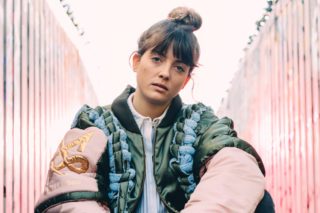
In the bubble of her home city it's impossible to ignore the political situation outside, and the media rule across the globe
If you haven’t seen the video for Noga Erez’s debut single, ‘Dance While You Shoot’, seek it out. Directed by Zhang + Knight, and inspired by Richard Mosse’s award-winning infrared photography series, it stitches together a series of ominous images and interactions in eerily-deserted concrete vistas, its greyscale cinematography interrupted by the erratic pop of fuchsia pink to signify “violence, corruption and desperation.” Interspersed are shots of Erez, variously stationary and dancing, but always regarding the camera with a cool, defiant demeanour. The effect is enthralling, disorientating and disquieting, and consequently the perfect match for the Tel Aviv-based singer-songwriter’s incendiary and idiosyncrasy-rich electronic-pop. Simply in terms of fulfilling the brief to deliver an enduring first impression, the combination of music and visuals is close to unbeatable.
“It was exactly what I wanted because it showed a very intense reality in a very spectacular way,” Erez agrees when we catch up in her East London Airbnb rental, the day after her first UK headline show. That “intense reality” was further amplified by their decision to shoot the video in Ukraine, following Russia’s recent annexation of Crimea, though the original plan was to film in the ghost town of Pripyat, which has been deserted since the Chernobyl disaster. “That was the first reason we wanted to do it in Ukraine, but we ended up finding even more interesting locations in Kiev. It’s an interesting place; it has a very dark side to it. And going there would just be me approaching the subject from a more global perspective.”
The song itself examines the protagonist’s reliance on a government that, in Erez’s own words, “takes your money, keeps you in the dark about the real, important matters that affect your life directly, while drowning you in manipulative media, ignorance and bureaucracy.” Erez’s vocals are variously layered, pitch-shifted or distorted with autotune, as she taunts the listener, growling lines like, “I can chop you with no knife, with no gun in my hand, I can hit you, keep you down.”
Interestingly, when I suggest that the song’s anti-establishment sentiment is overtly political, she’s quick to challenge me: “I mean, can you say ‘political’, just talking about how you feel about your government? Is that political? I don’t know. That’s what I think, what I feel.” Erez’s reticence to be drawn into specific detail, or to nail her colours to any particular political mast, isn’t the result of media training, however; it’s the natural outcome of 26 years spent navigating the complex realities of life in Israel.
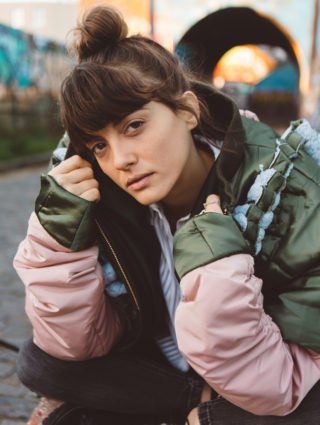
Born just outside of Tel Aviv a few months prior to the beginning of the Gulf War, Erez can’t recall a time when she wasn’t conscious of the political climate. “It’s not like Israel is a war zone; it’s calm most of the time,” she clarifies, “but from time to time it gets heated, and I was born into that. I remember being a child in a shelter. But I was never in that situation as much as the people that live around the borders [of Israel], not to mention people that live on the other sides of the borders.”
Despite its proximity to the West Bank, Erez describes Tel Aviv as a “bubble inside of Israel,” largely insulated from the surrounding conflict. “Tel Aviv is where you find all the very, very liberal people, and it’s all about music and culture,” she explains, adding, “It’s like somewhere else in the world.”
“So I’m always in-between trying to completely ignore [the situation] on one side of the scale and, on the other side, I can get kind of obsessed with it, because it’s so intense, because I’m a sensitive human being, and because it’s presented in such an interesting way. Watching the news can be like watching a TV show, and I get really, really interested – and sometimes obsessed – with those issues. And when I get too obsessed, I want to forget about it completely. So my way of staying balanced in-between is music. Music is music for me, first and foremost, but it has become a way for me to not become super-involved with what’s happening, but still be attached to it emotionally.”
That Erez is able to maintain equilibrium via her creativity is doubtless due to the dominant role music has always played in her life. Though neither of her “very open and liberal” parents are professional musicians, Erez fondly speaks of her father as being able to play any instrument he picks up, and credits inheriting her own “very, very low” singing voice from her mother. Encouraged to pursue whatever interested her, she took singing and piano lessons before progressing on to study composition and arranging. It wasn’t until high school that she found “the confidence to cooperate with other musicians,” but from thereon in she immersed herself in collaboration, joining and forming a string of bands. She downplays her eventual decision to pursue music professionally with a shrug: “I never had a plan B.”
Her big break came providing backing vocals and percussion for acclaimed, Tel Aviv-based indie-folk project The Secret Sea, spearheaded by cult hero Amit Erez (no relation). Running in tandem to this, she kept her composition skills sharp by forming a jazz trio, with whom she recorded an album that was subsequently discarded. “It came out like some exercise that a student does,” she explains, when I express surprise. “I looked back at the whole thing and said, ‘Ok, it shows that I know some things about music, but this is not the musician I want to be.’ And then I started exploring combining computers and music.”
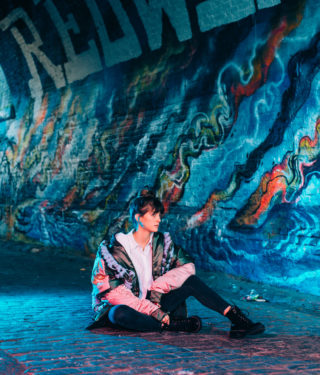
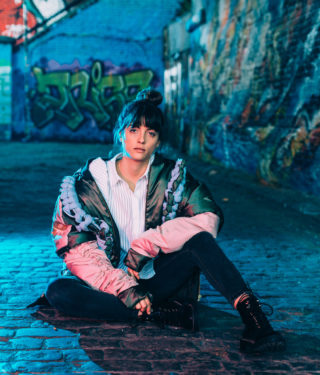
It was in this early phase of her experimentation with electronics that Erez was commissioned for a commercial project, and subsequently introduced her to creative partner, co-writer and producer Ori Rousso. We’re briefly introduced at the apartment today – before he disappears into another room for the duration of the interview – and he lingered in the shadows, performing sound engineer duties for Erez and her prodigiously talented percussionist Ran Jacobovitz, during last night’s show at a thrift store-cum-music venue in Hackney. Though Rousso patently displays zero interest in sharing the limelight, Erez is at pains to emphasise the importance of his creative contribution.
“The current songs sound the way they are because of him,” she enthuses. “He’s a sound master; very, very strong in the technical matters of music and sound, and an amazing composer. You can say that the lyrics come from me but that wouldn’t actually be very accurate because I start something and he makes it sound and mean something completely different. We just throw ideas at each other and that atmosphere creates the music that we make.”
Three years into their creative partnership, they’ve hit their stride. On ‘Dance While You Shoot’ the combination of intricately-layered electronics and teeth-rattling beats bring to mind the work of Fatima Al Qadiri or recent Warp-signing Lafawndah, while Erez’s commanding spoken-word vocals boast all the combative swagger and insouciant self-possession of M.I.A. Catchier still is ‘Off The Radar’, its irresistible groove driven by typewriter-effect percussion, doomy sub bass and a Sylvan Esso-ish vocal loop that scans, “Hear me? No-one sees me, I’m off the radar”, all topped off with a fantastic, oboe-effect riff. Lyrically, it tackles “technology and what it does to the individual”, specifically, “How confused we are as a generation because of social media,” and, “How we build our identity online and how much control we have.”
Erez’s next single, ‘Pity’, is even more unsettling, thanks to lyrics inspired by a 2015 court case concerning an alleged gang rape at a Tel Aviv nightclub, which was mediated to the world in real time via smartphones. Deeply disturbed by the incident, Erez used it as a jumping off point to explore the idea of “being a woman in the world”, specifically, “How I use that or how I’m used because of it.” The song’s dark subject matter is reflected in an unsettling and starkly minimalist arrangement, underpinned by abrasive electronics and militaristic drum rolls.
They’re about to shoot the video for it with Zhang + Knight here in London, and the rough premise is a performance-based video featuring a giant bank of old television sets, each screen displaying Erez from a different, albeit uncomfortably-intimate angle. It’s going to be “intense and fun at the same time” she explains excitedly, unwittingly nailing her personal brand in the process.
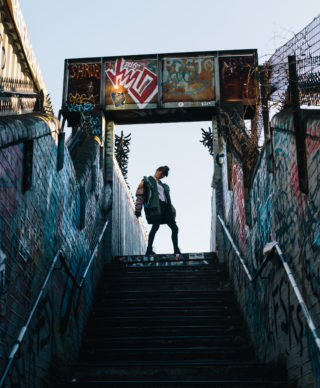
It’s this unique perspective that attracted the attention of Berlin-based independent label City Slang, home to Caribou, Gold Panda and Lambchop, amongst others. I wonder if there’s any resentment towards Erez back home due to her scoring a record deal outside of Israel, but she’s quick to emphasise how tight-knit the music scene is: “It is very vibrant, and because Tel Aviv is a super-small city, everyone knows everyone, [so] being a part of this scene is like being part of the community.” She speaks warmly of the city’s nightlife and alludes to an abundance of musical talent – including “several good, female, electronic acts, each of us doing something very different” – praising a positive atmosphere, centred around “helping each other, as opposed to being in competition.”
Even so, Erez’s standing amongst the country’s current crop of talent is reflected in the decision of Israel’s Ministry of Foreign Affairs to send her to the Rio Olympics as part of a limited musical delegation. She still seems slightly bemused by their decision (“When they approached me, I was like, “What the fuck?!”), citing the government’s track record of promoting “more formal, more traditional” musicians. “[This time] they wanted to show another side of Israel, I would say,” she reflects with a shrug, adding, “Something fresh and young.” For the time being, Erez seems happy to seize the manifold opportunities presented to her, admitting with a grin, “I’m so energetic, and I like being busy.”
It’s just as well really, because her schedule for 2017 seems destined to fill up fast. Already confirmed are appearances at SXSW and Primavera Sound in Barcelona, plus there’s the small matter of her debut album. With a label representative looking on today, Erez is cagey about the specific details, but she does confirm that the as-yet untitled record was written over the past two years, that it’s in the final stages of mixing and should be due out sometime in Spring.
“We never recorded it thinking it was gonna be an album; we just recorded stuff,” she reveals. “Then, when City Slang came, it was like, ok: we need to collect the songs and make them into one. But I always felt like there was some kind of freedom in not trying to think about the context at all, but just making songs separately. But now, because I have this mission that I need to put them together and contextualise them, it’s a whole different forum of art and a whole different level of music.
“It’s not a conceptual album at all. And when you hear it you will also hear that it was written, composed and arranged in different times in my life and Ori’s life. You will hear a lot of difference between the songs, but something does combine them together: the sound and the vibe of it. But we had that dilemma, like, do we want to maintain a vocal sound throughout the album to glue it together? And we decided, no. We wanted to be very, very diverse and very crazy. Because that’s the thing about this album: it’s messed up, and that’s who I am right now as an artist. I’m just exploring whatever I can.”